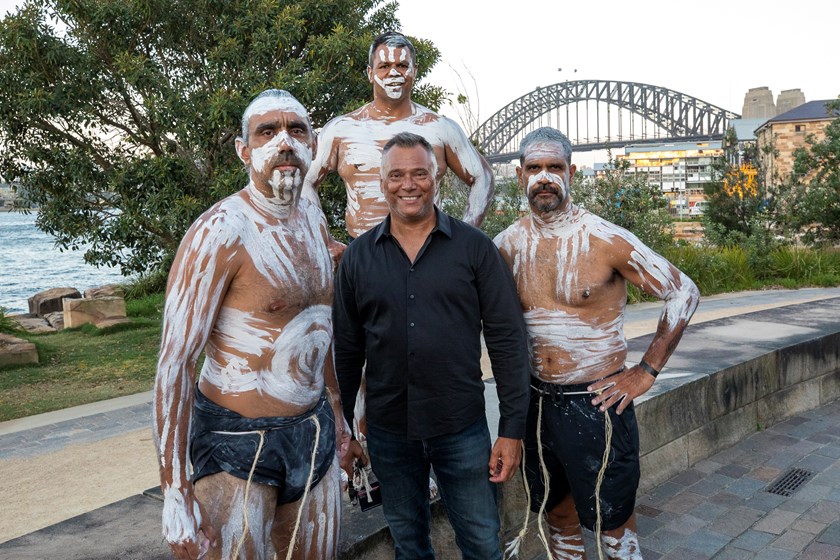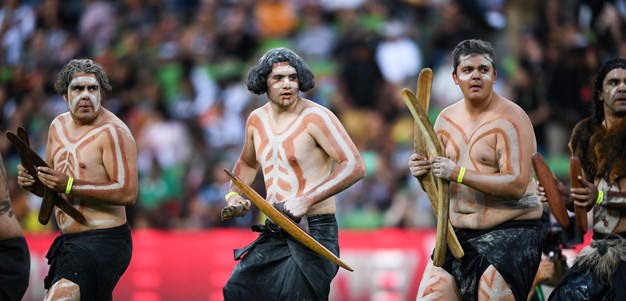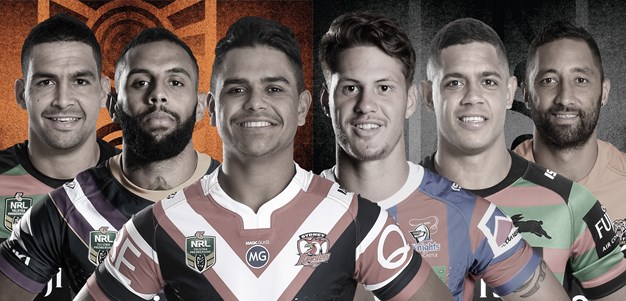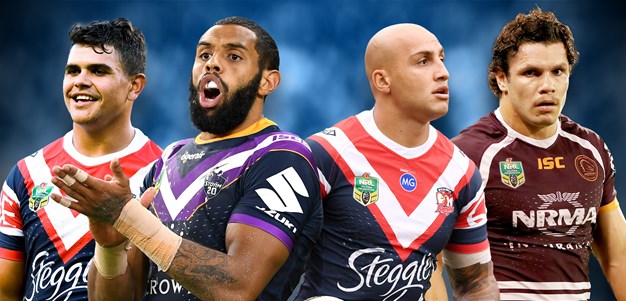Dean Widders still hopes to see the Kangaroos perform the Unity Dance developed for the Indigenous All Stars as an Australian version of the haka, but he no longer feels it is solely his responsibility to push for it.
Widders has spent more that seven years convincing others of the power of an Indigenous dance and an idea which grew out of the 2014 NRL Indigenous players’ camp is now the subject of a film, Araatika: Rise Up!, which is being screened at the Sydney Film Festival on November 6 and 7,
At the time, the goal of the former Roosters, Eels and Rabbitohs forward was for the Kangaroos to perform the Unity Dance at the 2017 World Cup.
Former Australian captain and coach Bob Fulton was a supporter but momentum stalled after injuries to Greg Inglis and Johnathan Thurston, coupled with a loss of form by Sam Thaiday.
However, the dance has now been firmly embraced by the Indigenous players who comprise 11 per cent of all NRL talent and transcended the game when Adam Goodes, Michael O’Loughlin and Stan Grant joined Widders, George Rose and Cody Walker to perform it earlier this year.
“My aim to start with was for the Australian team to perform it," Widders told NRL.com. "I saw that as a challenge, but I think it is now up to the Kangaroos or the game to get to a point where they feel comfortable doing it.
Trailer - Araatika: Rise Up!
“Obviously I am willing to support and push for that to happen but I feel that I have showcased the strength of this dance, I’ve showcased the strength of our culture and this has enabled the strengthening of Indigenous players and people in the game.
“I still see it as a challenge but I feel that I now have a lot more people taking on this challenge as well, whereas, to be honest, for a while there I thought that I was only the one who believed in this dream.”
This reporter was privileged to attend the Hunter Valley camp before the 2014 All Stars match in which Widders outlined his vision and Bangarra Dance Theatre artistic director Stephen Page began to work with the players on the development of the Unity Dance.
Besides Jonathan Wright, Dane Gagai and Tyrone Roberts, who had dance backgrounds, few of the players appeared comfortable before Inglis rose from a circle of Indigenous All Stars team-mates in the first public performance of the Unity Dance.
“It was an idea that I felt strongly about but there wasn’t actually anyone driving it amongst the players," Widders said. "I virtually had to do the pleading and the convincing and the pushing to try and get them across the line, and it took a long time.
“I still remember the whiteboard in the room on the Gold Coast, with Greg Inglis and Johnathan Thurston to-ing and fro-ing, and guys like George Rose, Will Chambers and Jonathan Wright being very prominent in leading that.

“For me it was very exciting to see how passionate those guys were about it. A lot of the boys were shy to get up and dance. They were so nervous about it and I guarantee you back then that a lot of them didn’t want to perform it before the game.
“They just wanted to get out there and play, but I think now it has strengthened their ability to believe in themselves as cultural leaders and cultural warriors. That strengthens you in other ways, not just in your footy.”
Positive influence
Araatika: Rise Up!, which will also feature in the Travelling Film Festival, traces the journey of Widders from a young boy in Armidale with NRL dreams to an Indigenous leader who believed the game could have a positive influence.
To see the way Greg stepped up from the middle was really powerful.
The film also addresses the institutionalised racism of the White Australia Policy and the Freedom Rides, in which Rose’s grandfather, George, was a key figure, that led to Aboriginals being awarded full citizenship rights after the 1967 referendum.
“Sport is the only place Indigenous people are over-represented besides jails so footy players are a powerful group and the biggest role models in our communities,” Widders said.
“If we are the only ones that non-Indigenous people get to see and we are proud and we are generating positive stories then we can create a positive influence. We can lift others up, and we can prevent people going to jail or prevent people getting on drugs and alcohol.
“Even just to change that a small bit is a massive challenge, and we have got to stand up in lots of different ways, but I think that there has been a powerful change in the boys’ attitudes towards culture and the strengthening of how they feel as cultural leaders.”
'Proud, strong, no fear'
To see the Indigenous All Stars perform the Unity Dance before the 2016 match was a proud moment for Widders but he wanted it to be more than a pre-match ritual for one game a year.
Widders faced the haka while playing for the Indigenous Dream Time Team against Aotearoa Maori before the opening match of the 2008 World Cup and he believed a dance could unite Australians in a similar way that the haka does for Kiwis.
Inglis takes centre stage for Indigenous War Cry
“The dance, especially with its connection to rugby league, invites people in to learn about culture and it is very welcoming for non-Indigenous people to get on board with, to support and to see the strength of it," Widders said.
“To see the way Greg [Inglis] stepped up from the middle was really powerful. He was proud, he was strong, he was focused, he had no fear – they are not words that are not associated with Indigenous communities a lot and we need to change the lens that people look at Indigenous communities.
“Years ago, you wouldn’t get a footballer talking about culture or anything in our communities but now guys like Cody [Walker], Latrell [Mitchell] and Fox [Josh Addo-Carr] feel proud to do it.”
Behind the Indigenous war cry
Beyond league
The film culminates with the performance of the Unity Dance on January 25 at The Vigil - a celebration of Indigenous culture and history organised by Sydney Festival on the eve of Australia Day.
The performance was co-directed by Widders and Page, from Bangarra Dance Theatre, and the event bought together sports stars such as Walker and Goodes with members of the entertainment and arts worlds.
Widders believes Araatika: Rise Up! will also appeal to a broad audience.
“There are a lot of people who don’t follow rugby league or sport, and the only Indigenous films that do well are when we are talking about all the negative things about our community or injustices and things that have gone wrong,” Widders said.
“There hasn’t been a great connection with stories that are uplifting or showcase our community in a great way.
“What I hope is that people walk out of the film and say 'I want to learn more, I want to do more in this space', or 'I have taken a step closer to opening my mind up to the idea that maybe one day we will do this dance as a nation and we can be proud of this culture as a nation'.
“That is just a first step but hopefully I have started the journey for a lot of people.”
Araatika: Rise Up! will screen at the Sydney Film Festival on Saturday November 6 at 2pm and Sunday, November 7 at 1.30pm.
It is also be part of the Travelling Film Festival at Cairns on November 9 and Warrawong on November 28.





